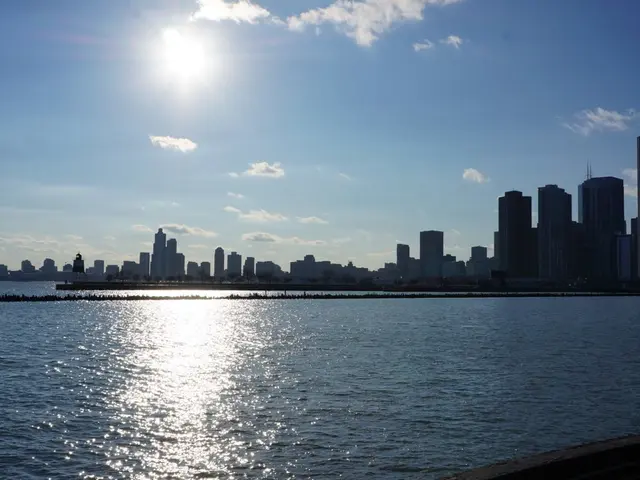Summer's Sticky Sensation: Unveiling the Factors Behind This Year's High Humidity
The summer of 2024 in the United States has been marked by a significant increase in heat and humidity, making it a particularly challenging season for many. This article explores the factors contributing to this trend, with a focus on climate change and its impact on our weather patterns.
The increased humidity and heat in summer are primarily caused by a combination of factors. More moisture in the atmosphere due to increased evaporation from warmer ocean surfaces and irrigated crops like corn and soybeans, which release water vapor through transpiration, is a significant contributor to local humidity [1][3][4]. Land use changes, specifically converting forests and prairies to irrigated croplands, also add moisture locally by releasing more water vapor into the air [1].
Warmer ocean temperatures, especially in the Atlantic and Gulf of Mexico, increase atmospheric moisture, raising dew points and summer humidity, intensifying the sensation of heat [3]. Climate change exacerbates this trend by increasing global temperatures, which enhances evaporation rates and allows the atmosphere to hold more water vapor, thus raising humidity levels [4][5].
Raising ocean surface temperatures makes high humidity and extreme heat events more likely and severe [3]. Climate change also causes more humid nights and less cooling overnight, leading to an overall increase in average summer temperatures, even if daytime highs sometimes moderate due to cloud cover and moisture [1][2]. Altered weather patterns, including more cloud cover and rainfall in some regions like the Midwest, further affect temperature and humidity dynamics [2].
This summer, sea surface temperatures have been much warmer than normal in some cases, driving up the heat index and posing a dangerous trend as it makes it harder to cool off naturally [6]. Humid air is driving up the heat index, with dew points consistently being at least in the low 70s throughout this summer in much of the South [7]. Nearly half of the country has experienced record-breaking muggy conditions this summer [8].
The stronger Bermuda high, a semi-permanent area of high pressure over the Atlantic Ocean, has been stronger than normal in June and significantly stronger compared to the same time in 2023 and 2024 [9]. This has sent frequent pushes of waterlogged air into the US, causing dew points to skyrocket and the atmosphere to be loaded with moisture, fueling flooding storms [10]. Abnormally moist, hot air has been flowing north out of the tropics into almost all regions east of the Rockies all summer - and for much of the year [11].
The Midwest has experienced much more muggy conditions than corn can influence single-handedly this summer [12]. The warmer ocean temperatures this summer are attributed to climate change [13]. June through July marked the muggiest start to the season in more than 40 years [14]. The Climate Shift Index, developed by Climate Central, indicates that hotter than normal sea surface temperatures in the Gulf and the Atlantic off the Southeast coast last week were up to 500 times more likely due to climate change [15].
In conclusion, a warming planet drives more water vapor into the atmosphere through warmer oceans and increased evaporation, which in turn makes summers both hotter and more humid. Land use changes such as widespread irrigation also add moisture locally. These effects combine to create the "sticky" and oppressive summer humidity increasingly observed across the U.S., with more frequent hot nights that strain human health [1][3][5]. A climate heating up from fossil fuel pollution is changing summer as we know it.
Environmental science reveals that the increased humidity and heat in summer are largely caused by climate change, with warmer ocean temperatures playing a significant role. According to the article, climate change exacerbates global warming, thereby enhancing evaporation rates and increasing atmospheric moisture, contributing to higher humidity levels during the summer season.








